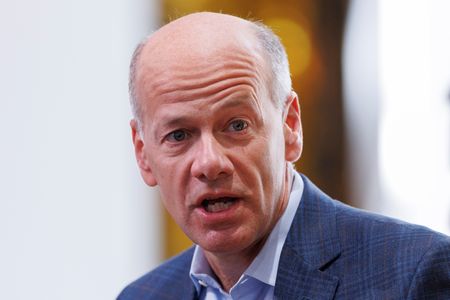 1
1 1
1
By Pete Schroeder and Hannah Lang
WASHINGTON (Reuters) -Greg Becker, former CEO of failed lender Silicon Valley Bank, apologized in congressional testimony for its “devastating” collapse while citing rising interest rates and mounting withdrawal requests as key causes of its demise.
The bank was responsive to regulator concerns about its risk management and working to address issues when an “unprecedented” bank run led to its failure, Becker wrote in prepared testimony published on Monday by the Senate Banking Committee.
“The takeover of SVB has been personally and professionally devastating, and I am truly sorry for how this has impacted SVB’s employees, clients and shareholders,” he said.
Becker’s account contrasts with those of regulators and banking industry executives who blamed SVB’s leadership for its failure to manage interest rate risks or diversify its business beyond the highly concentrated tech sector in the Bay Area.
Becker said he did not believe “that any bank could survive a bank run of that velocity and magnitude.” He also rebuffed regulators’ assertions that SVB failed to manage interest rate risks, saying that up until late 2021, the Federal Reserve had indicated that interest rates would remain low and that rising inflation was merely transitory.
Fed supervisors did not fully appreciate the problems at SVB and failed to escalate deficiencies even after they were identified, the regulator said in a report last month.
Becker, along with Signature Bank’s former co-founder and Chairman Scott Shay and former President Eric Howell, are set to testify before the Senate Banking Committee on Tuesday at 10 a.m. EDT (1400 GMT). They will appear publicly for the first time since their firms collapsed.
The former executives for New York-based Signature Bank, which also failed in March, maintained the bank could have survived had regulators not chosen to close it, according to separate testimony.
Signature’s failure was caused by “poor management” and a pursuit of “rapid, unrestrained growth” with little regard for risk management, the Federal Deposit Insurance Corp (FDIC) said last month.
California banking regulators moved quickly to shut SVB down on March 10 after depositors withdrew $42 billion in 24 hours. Two days later, regulators closed Signature.
Federal regulators invoked emergency powers to backstop all deposits at SVB and Signature, even those above the limit guaranteed by the FDIC. Officials facilitated the sale of SVB and Signature to other banks.
TUESDAY HEARING
The hearings will be the first chance for lawmakers to grill the three executives.
Some lawmakers have also rebuked Becker for awarding bonuses and questioned whether he and others profited from stock sales before SVB’s collapse.
Becker defended those sales in his testimony, claiming he regularly sold shares underlying his stock options as part of a plan.
Bank regulators will also appear before Congress on Tuesday at a separate House of Representatives hearing. Lawmakers are expected to question their oversight of the lenders, how they handled the failures and their decision earlier this month to broker a sale of troubled First Republic Bank to JPMorgan.
(Reporting by Pete Schroeder and Hannah Lang in Washington;Editing by Chris Reese and Cynthia Osterman)